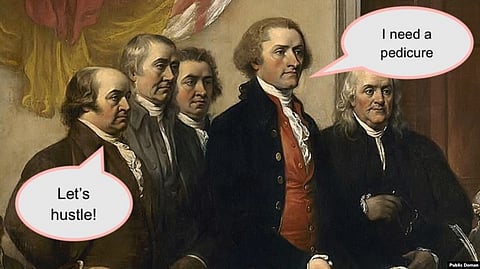
- Home
- न्यूजग्राम
- NewsGram USA
- India
- World
- Politics
- Entertainment
- Culture
- Lifestyle
- Economy
- Sports
- Sp. Coverage
- Misc.
- NewsGram Exclusive
- Jobs / Internships

By Dora Mekouar
Thomas Jefferson, America’s third president, coined the words “electioneering” and “indecipherable.” John Adams (No. 2) came up with “caucus.” James Madison (No. 4) was the first to use “squatter” when referring to someone who occupies a property or territory they don’t own.
As they set out to build a new nation, America’s Founding Fathers were determined to give the fledgling republic its own identity and culture by making up new words that were unique to the American experience.
“It was thought by many of the early presidents — Jefferson, Adams, [George] Washington and others — that they were doing something important,” says Paul Dickson, author of “Words from the White House: Words and Phrases Coined or Popularized by America’s Presidents.” “It was this belief that we were separating ourselves from the British.”
The practice of making up new words outraged British purists, some of whom viewed Americans as people without a language who stole England’s mother tongue.
“Some of the first words that the British really went crazy over were the words ‘congressional’ and ‘presidential.’ They said they were barbarous,” Dickson says. “But those were words we needed. George Washington, one of the words he created — and again, this helped frame who we were — he talked about his ‘administration.’ That word never existed in terms of a noun to describe the body of people that ruled with you in your Cabinet.”
In some cases, the presidents didn’t come up with the words and phrases. Some were created by speechwriters, aides and other acquaintances and then popularized by the president. For example, John Jay, Washington’s secretary for foreign affairs, is said to have coined “Americanize.”
A key nonpresidential figure who helped codify these new Americanisms was Noah Webster, who published his first dictionary in 1806. Webster fought in the Revolutionary War, which secured America’s independence from England. While wandering through a New York military camp filled with war veterans, he saw the need for a unique American language.
“He was hearing voices of Indigenous people. He was hearing Irish brogues. He was hearing all sorts of different kinds of language and different kinds of speaking, and heavily accented,” Dickson says. “And he realized that this country is going to be a big mix of different people, different interests, and it needed a new language. It needed something called the ‘American language,’ which is a term he created. … Noah Webster actually said that creating a new language was an act of defiance.”
While future presidents also coined new words, Dickson says the founders were particularly prolific. Jefferson alone is credited for coming up with more than 100 words, including “belittle,” “pedicure,” “monotonously” and “ottoman” [footstool]. Fittingly, he also invented the verb “neologize,” which is the practice of coining new words or expressions.
Instead of saying “within doors,” Washington created the word “indoors.” The first president also came up with “average” [medium sum or quantity] and “New Yorker.”
Adams borrowed from the classic Spanish novel, “Don Quixote” to create the adjective “quixotic” [unrealistic schemes]. The first recorded uses of “hustle” [to move rapidly] and “lengthy” [long, protracted] came from Adams’ journal entries.
Although the earliest American leaders started the practice, neologizing eventually became something of a presidential tradition.
“There were certain presidents that have a knack for this, and some of it was conscious. Some of it was sort-of semi-conscious,” Dickson says. “It became, it was, sort of, the American way.”
Despite inventing numerous memorable words and phrases, America’s early leaders fell short of coining a term to describe themselves — the extraordinary group of men who founded the United States and created the framework for its government. That didn’t happen until a century later.
In the 1920s, President Warren Harding dubbed them the “Founding Fathers” and in doing so, created one of the most memorable and iconic Americanisms of them all. (VOA/SJ)
